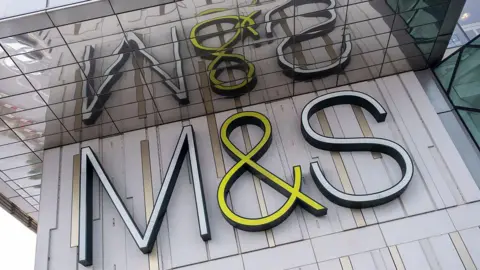M&S boss says extending Brexit food labelling is madness
 Getty Images
Getty ImagesThe decision to extend post-Brexit food labelling on products being shipped from Great Britain to Northern Ireland has been criticised by the chief executive of Marks & Spencer.
The "Not for EU" labels have been phased in since 2023 with the final phase to be implemented next week, but the labels are likely to become unnecessary when the UK and EU finalise a new agrifood deal.
Stuart Machin said it was "bureaucratic madness" and the new deal "can't come soon enough".
The government said it will "continue to work closely" with businesses and support them in implementing these arrangements.
The labelling is a requirement of the Windsor Framework, the revised Brexit deal for Northern Ireland.
It is part of a broader package of changes to the 2019 Brexit deal for Northern Ireland - known as the NI Protocol.
The protocol kept Northern Ireland inside the EU single market for goods, which allowed a free flow of goods across the Irish border.
However it made trading from Great Britain to Northern Ireland more difficult and expensive.
'Bureaucratic madness'
Checks and controls on GB food products entering Northern Ireland have been some of the biggest practical difficulties.
Under the Windsor Framework, UK public health and safety standards apply for all retail food and drink in the UK internal market.
That means GB traders who are sending food for sale in Northern Ireland face reduced checks and paperwork compared to the protocol.
The flipside of this is the introduction of the "Not for EU" labels on GB food products, to give a level of assurance to the EU that products will not wrongly enter its single market.
Mr Machin said the final phase of labelling would mean more than 1,000 Marks & Spencer products destined for Northern Ireland would need to have a "Not For EU" label.
Another 400 would need to go through additional checks in the so-called red lane at NI ports.
"Quite frankly it's bureaucratic madness, confusing for customers, and completely unnecessary," Mr Machin said.
Certain products labelled
In May the government announced an "agreement to agree" which will ultimately see all of the UK realigning with EU agrifood rules.
In response to Mr Machin's comments, a government spokesperson said the labelling will only be required for certain food and drink products.
"Many things like cakes, bread, pasta and alcohol will not need to be labelled," it added.
"And when implemented, agreements we secured at the UK-EU Summit will reduce the need for this labelling and make it easier to move goods between the UK and Europe."
